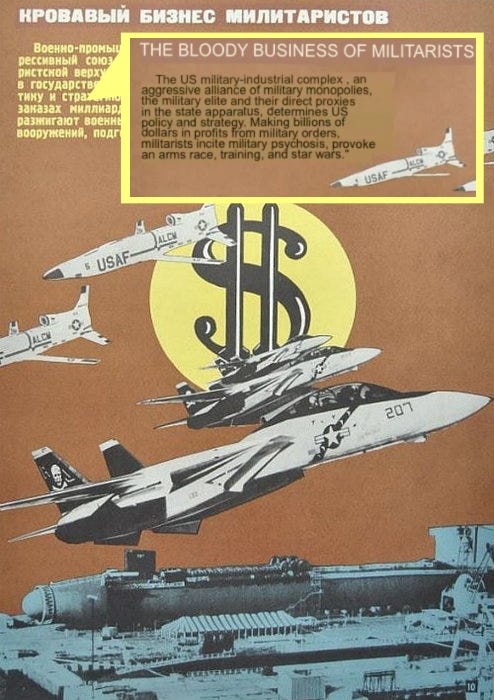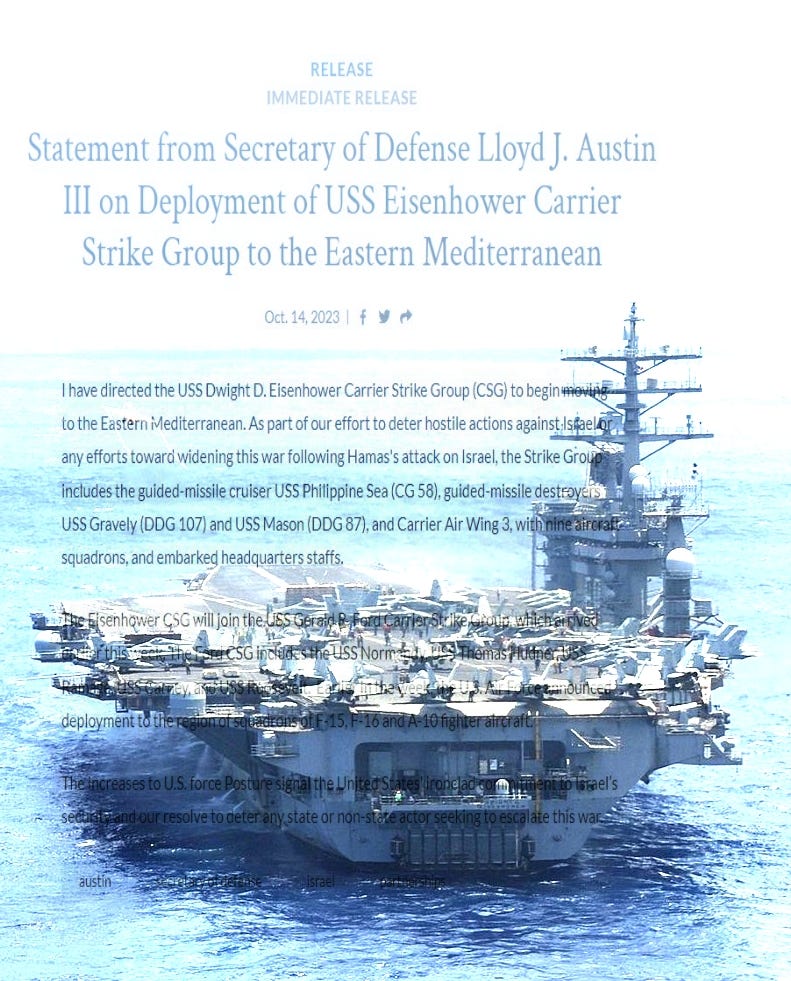Battleships and Bottom Lines Take Priority as the US Navy Advances to the Mediterranean Sea
The U.S. Navy's significant deployment to the Mediterranean showcases the intertwined relationship between global conflicts and economic interests.
The pervasive influence of the financial incentives of war should not be forgotten as the world witnesses the continual expansion and escalation of military engagements. The American deployment of a massive naval armada, including two US aircraft carriers and a fleet of accompanying ships, to the Eastern Mediterranean, speaks to Washington’s bloodlust as it refocuses on the Middle East.1 When powerful entities such as the US and NATO amass significant military power in volatile regions, the potential for escalation and expanded conflict is not only evident but profoundly disturbing. While this tremendous demonstration of power may ostensibly serve as a mere show of force, the destructive power the American navy is capable of is anything but pageantry.

These tactical movements, emblematic of a militaristic policy that has served as NATO’s modus operandi since its inception, are not merely reactive responses to an unexpected crisis. There have been many opportunities to calm the situation in the Middle East, just as there had been in the Eastern regions of Ukraine prior to February 2022. Washington’s position is clear; it wants war and sacrifice any amount of blood necessary to get the conflicts it needs to advance the West’s geopolitical position, kill off massive amounts of the world’s population, and enrich the global elite through the arms industry.
The role and responsibility of the United States in the generation of this conflict has been entirely left out of the narrative, which has taken the usual binary perspective of ‘heroes’ and ‘villains’ instead of pausing to examine the origins of the weapons, ideologies, and funding on both ‘sides’ of the conflict. This was perhaps best explained on the House floor by Ron Paul, who explains in detail how the United States helped Israel to create and fund Hamas. It becomes easier to see through the public deceptions when you remove federal government’s rhetoric and instead examine its behaviors and spending patterns, both of which point to a disturbing possibility that the sort of situation currently unfolding in Gaza is exactly what they wanted to happen.
While the US federal government continues to propagandize its population with the same delusional tales of global superiority they were telling as they effectively lost every single armed conflict they participated in since the Second World War. When asked about whether the US could afford to support both Ukraine and Israel at the same time, President Biden responded with the predictable “most powerful country in the history of the world,” rhetoric, explaining his capability to “take care of both and still maintain our overall international security.”
The conflict in Gaza will no doubt follow the West’s pattern of uncivilized “diplomacy” enforced with continually manufactured firepower and profitable technological development. White House National Security Advisor Jake Sullivan and US Secretary of State Antony Blinken have shared insights that not only confirm the government’s intent to escalate its involvement in the war but also hint at potential broader conflicts, specifically implicating Iran. For now however, Iran has made it clear that it has no intention of becoming involved in the conflict directly so long as there are no Israeli strikes on Iranian soil. It may be safe to expect such strikes at some point in the near future unless the situation relaxes. Of course this would only come after the Western public has been thoroughly convinced of Iran’s involvement, which the media is working on rather effectively at present.
Various countries, like the US, deploying military aid and weaponry to conflict zones, simultaneously witness a surge in defense contractor stock values, thereby reaping economic gains domestically. Notably, the diverse international military support, such as the Chilean Airforce supplying ground weapons to Israel and the US donating M270 MLRs, highlight the financial aspects intrinsically linked with warfare, given the significant costs associated with mobilizing and supplying military assets abroad. With no diplomatic solution in sight, the defense industry is likely to continue to thrive. The first tranche of military assistance has been dispatched and received in Israel, with further financial and material investments in the pipeline with plans to allocate resources toward the provision of ammunition, interceptors, and other defensive materials to repair Israel’s Iron Dome.


Viewing the situation through a multipolar lens, the Russian response to the conflict stands out as notably reasonable, especially when juxtaposed with calls from the US advocating for a blockade of the Hamas-controlled Gaza Strip. Drawing a parallel with the siege of Leningrad during World War Two, Russian President Vladimir Putin warned the international community that implementing a Nazi-style blockade on Gaza would invariably result in an "absolutely unacceptable" number of civilian casualties. While this comparison is insightful, he seems to forget in his remark that there are some who find the possibility of such devastating casualties as perfectly acceptable— as evidenced by statements from various American politicians and media personalities. Nevertheless, the Russian standpoint on this matter carries significant weight. The experience and knowledge acquired from over seventy years of dealing with NATO and Israel manifest eloquently in Soviet-Era posters, revealing how little has changed in some aspects over the decades.
Under the veneer of binary international conflicts, nations like the US strategically flex their military muscles, not just as a demonstration of dominance but also as a calculated move to fortify their economic standing. This interplay between war and wealth becomes evident in the thriving defense industry and the global elites who manage it. As the line between aggressors and defenders blur, voices like Russia's emerge as valuable reminders of historical lessons and the possibility of devastating consequences. These contrasting viewpoints, highlighted against the backdrop of historical experiences, serve as a warning against repeating the mistakes of the past. Ultimately, the world must reflect on the cost of human lives sacrificed at the altar of profit for a privileged few.
-The Shultz Report by M. Shultz





